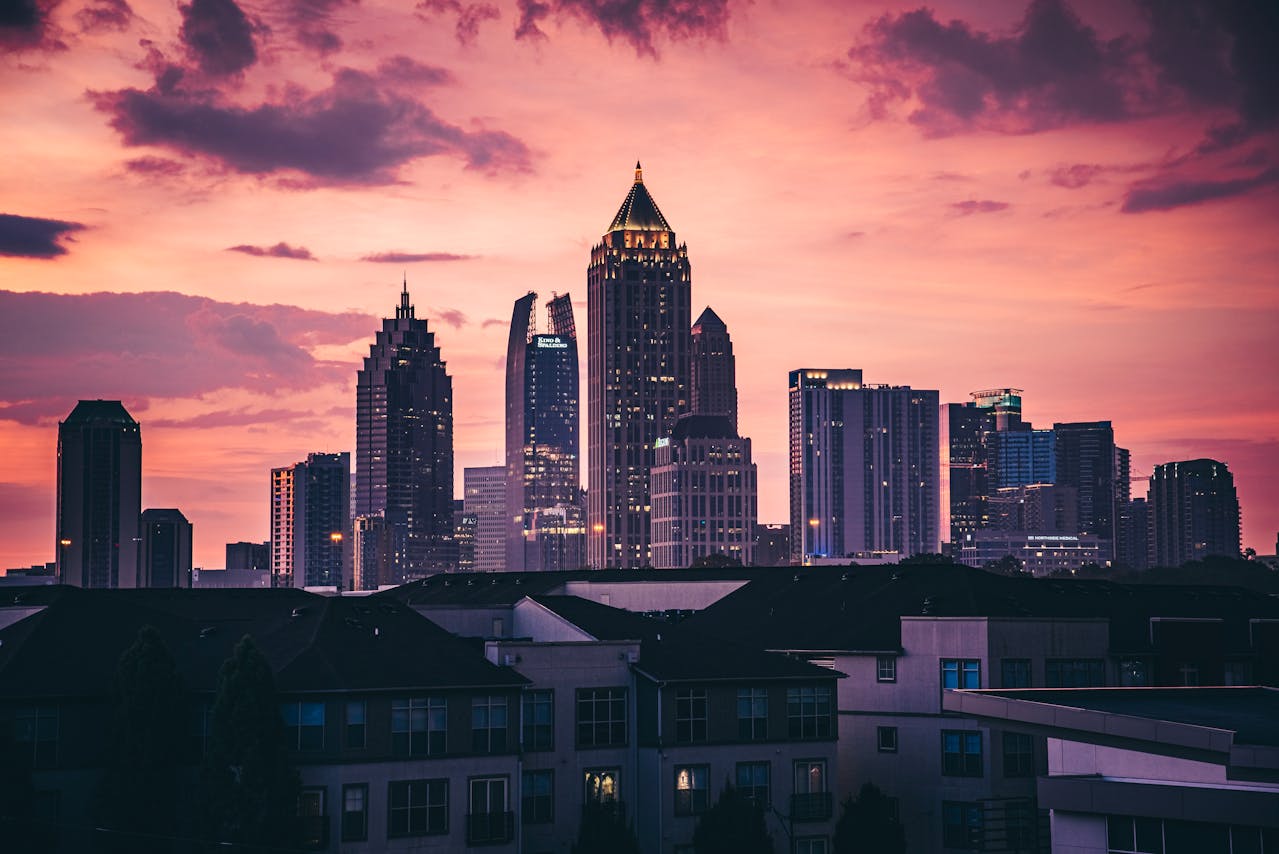If you’re a first-time landlord, learning how to manage a rental property yourself is a feat worth celebrating. But before you jump headfirst into property management, be prepared for a wh...
A Guide to Wholesaling Real Estate in Georgia


Are you looking for a real estate investment opportunity with a Southern charm? Consider wholesaling real estate in Georgia.
The Peach State is a goldmine for wholesalers. It has a high rate of foreclosure and plenty of distressed properties that could be flipped for a profit.
If you’re new to wholesale real estate, getting started may take some work, but the rewards are as sweet as a Georgia peach. Read on to learn more.
Key Takeaways
- You must have a real estate license to wholesale properties in Georgia.
- Georgia has plenty of low-price homes and foreclosures that provide opportunities for quick wholesale deals.
- You can locate wholesale properties in Georgia by checking county records, joining REIA’s, and searching the Georgia MLS.
- In Georgia, you have the potential to earn six figures from wholesaling properties.
What is Wholesale Real Estate?
Wholesale real estate is a business strategy where an investor (known as a wholesaler) contracts a property with a seller and then assigns that contract to an end buyer for a higher price.
The wholesaler makes a profit from the difference between the contracted price and the price paid by the end buyer. This process typically involves distressed properties or motivated sellers who need to sell quickly.
Real estate wholesalers in Georgia don’t usually purchase the property themselves but act as intermediaries and facilitate transactions between the sellers and the buyers.
What Are the Key Benefits of Wholesaling Real Estate in Georgia?
Wholesaling real estate offers several key benefits that make it an attractive investment strategy for both new and experienced investors. Here are some of the primary advantages:
- Wholesaling requires minimal upfront capital compared to traditional real estate investing.
- Wholesaling deals can be completed relatively quickly, often within 30 to 45 days.
- Since wholesalers don’t hold onto properties for extended periods, they are less exposed to market fluctuations and property management issues.
- Wholesaling is highly scalable. Successful wholesalers can manage multiple deals simultaneously.
- Wholesalers don’t need to manage properties, deal with tenants, or handle maintenance issues.
- Wholesalers can choose to assign contracts or conduct double closings, depending on what best suits their business model and market conditions.
- Depending on which county you look in, Georgia offers plenty of low-price real estate properties with the potential for high profit margins.
- You can connect with potential buyers simply by joining real estate investment groups across Georgia.
Step-By-Step Guide to Wholesaling Real Estate in Georgia
Conduct Market Research
Start by gaining an understanding of Georgia’s local real estate trends. Look for areas with high investor activity, rising property values, and strong rental demand.
Also, review comparable property sales throughout Georgia to understand what properties are selling for. Some state and national websites you can use include:
Build a Buyers List
Create a list of potential investors interested in purchasing wholesale properties in Georgia. Some ways to accomplish this include attending local real estate investment meetings, joining online real estate forums, and connecting with real estate agents.
The most popular ones in Georgia include:
- Georgia Real Estate Investors Association (GaREIA)
- Atlanta Real Estate Investors Alliance (Atlanta REIA)
- Savannah Real Estate Investors Alliance (Savannah REIA)
- North Metro Real Estate Investors Association (North Metro REIA)
- Real Estate Investment Association of Greater Gwinnett (REIA of Gwinnett)
- Middle Georgia Real Estate Investors Group (MGREIG)
- Augusta Real Estate Investors Association (Augusta REIA)
Find Distressed Properties
Identify properties that are undervalued or need significant repairs. Driving for Dollars is one of the most effective ways to accomplish this. Try driving through local neighborhoods looking for distressed properties.
Other ways to find distressed properties include:
- Sending postcards or letters to property owners.
- Browsing websites such as Zillow, Craigslist, and Georgia MLS for distressed properties.
- Checking the Georgia Superior Court Clerks’ Cooperative Authority, Georgia Public Notice, or local County Clerk of Court Websites (e.g. Fulton County, DeKalb County, and Gwinnett County)
Evaluate and Analyze Properties
Before settling on wholesale real estate in Georgia, assess the potential value and costs associated with properties.
Some ways to do this include:
- Performing a thorough walk-through or hiring a professional Georgia home inspector.
- Getting quotes from contractors to determine the cost of necessary repairs.
- Calculating the potential market value of the properties after repairs.
Getting a Property Under Contract
The next step is to secure a purchase agreement with the property owner. More specifically, discuss the price, closing timeline, and any contingencies with the seller.
Additionally, ensure the contract includes an assignment clause allowing you to transfer your rights to another buyer.
Market the Contract to Your Buyers List
Once you get a property under contract, find an interested buyer to assign the contract. Include property details, photos, repair estimates, and ARV.
You can also send the flier to your buyers list and arrange a time for potential buyers to view the property.
Assign the Contract
Once you’ve found a buyer, you’ll need to transfer the purchase agreement to them.
First, draft an assignment contract detailing the terms of the transfer. Once the assignment contract is complete, you’re ready to collect a deposit from the end buyer to secure their commitment.
Close the Deal
Lastly, you must finalize the transaction and receive your assignment fee. Ensure all paperwork is processed, and funds are disbursed correctly. Then, you should receive your assignment fee once the deal closes.
Is a License Required to Wholesale Real Estate in Georgia?
To wholesale real estate in Georgia, you generally need a real estate license from the Georgia Real Estate Commission & Appraisal Board if you are acting on behalf of another person.
This is because the act of finding buyers and sellers, negotiating sales, and earning a commission or fee from these activities typically falls under activities that require a real estate broker’s license according to Georgia law.
If you are wholesaling your own property or have equitable interest (such as a contract to purchase the property), you might not need a license.
However, the lines can blur if you are repeatedly engaging in wholesaling activities without a license, which can be seen as acting as a broker.
What are the wholesaling Real Estate Laws in Georgia?
Wholesalers often assign contracts. In Georgia, this is legal, but you must ensure the contract allows for assignment. Explicitly state your intent to assign in the contract to avoid legal issues.
Additionally, you must disclose your equitable interest in the property and your intention to assign the contract to another buyer. Lack of transparency can lead to legal challenges.
If you advertise properties you don’t own (e.g., those under contract for wholesaling), you must clearly state your role and interest in the property. Misleading advertising can result in legal action by the Georgia Real Estate Commission.
Is Wholesaling Properties Worth it in Georgia?
Wholesaling properties can be a lucrative venture in Georgia, but this depends on market conditions, your expertise, and how effectively you can manage the risks and legalities involved.
Additionally, the income potential in wholesaling can vary. The more deals you can close and the higher the value of those deals, the more you can make.
For example, on smaller deals, assignment fees might range from $2,000 to $10,000. For higher-value properties or more complex transactions, fees can range from $10,000 to $30,000 or more.
Moreover, some experienced wholesalers can earn six figures annually, depending on their deal volume and market strategy. Beginner wholesalers may earn around $40,000 or more.
Bottom Line
By understanding the legalities, building a strong buyers list, and mastering the steps from market research to closing deals, you can take advantage of this lucrative business strategy effectively.
Whether aiming for quick profits or scalable operations, wholesaling real estate in Georgia presents plenty of opportunities to put in the effort and diligence required to succeed.
Similar Articles
Explore similar articles from Our Team of Experts.




Managing a single-family property involves unique challenges and opportunities distinct from other real estate investments. You get to be the captain of your own ship, but the waters are oft...


In real estate finance, Northwind Group stands out for its strategic adaptability. Founded by Ran Eliasaf, a former Israeli Navy captain turned real estate executive, the firm has evolved fr...


If you’re a first-time property owner, you might be scratching your head wondering, “How much do property managers charge in California?” The answer, as always, depen...


gIn an era where one in three real estate transactions involves an investor, Bold Street AI is pioneering a technological solution to help real estate agents adapt to this shifting market dy...



